英语辩论稿范本北京外国语大学英语专业议会制辩论
- 格式:docx
- 大小:16.54 KB
- 文档页数:4
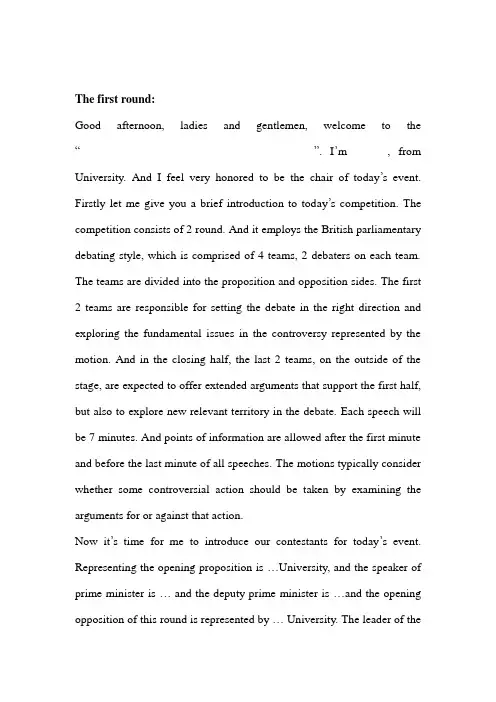
The first round:Good afternoon, ladies and gentlemen, welcome to the “”. I’m , from University. And I feel very honored to be the chair of today’s event. Firstly let me give you a brief introduction to today’s competition. The competition consists of 2 round. And it employs the British parliamentary debating style, which is comprised of 4 teams, 2 debaters on each team. The teams are divided into the proposition and opposition sides. The first 2 teams are responsible for setting the debate in the right direction and exploring the fundamental issues in the controversy represented by the motion. And in the closing half, the last 2 teams, on the outside of the stage, are expected to offer extended arguments that support the first half, but also to explore new relevant territory in the debate. Each speech will be 7 minutes. And points of information are allowed after the first minute and before the last minute of all speeches. The motions typically consider whether some controversial action should be taken by examining the arguments for or against that action.Now it’s time for me to introduce our contestants for today’s event. Representing the opening proposition is …University, and the speaker of prime minister is … and the deputy prime minister is …and the opening opposition of this round is represented by … University. The leader of theopposition is …and the deputy leader of the opposition is …The closing proposition this round is represented by ….University. And the member of the proposition is …and the speaker of proposition whip is …And the closing opposition this round is represented by …University. And the member of the opposition is … the opposition whip is….Before we continue, I’d like to remind everyone to turn the mobiles off, so as not to distract the debaters, thank you!The motion of this round is “”1. I would now like to call this house to order and invite the prime minister to the floor to open the debate on the motion that stands in his/her name. Thank you.2. I thank the prime minister for opening the debate; and now open the floor to the leader of the opposition for a constructive speech in opposition to the motion.3. I thank the leader of the opposition and now open the floor to the deputy prime minister to continue the case on behalf of the opening proposition.4. I thank the deputy prime minister and now open the floor to the deputy leader of the opposition to continue the opposition’s argument.5. I thank the deputy leader of the opposition and now open the floor to the member of the proposition to continue the proposition’s arguments.6. I thank the member of the proposition and now open the floor to themember of the opposition to continue the opposition’s arguments.7. I thank the member of the opposition and now open the floor to the proposition whip who will summarize the proposition’s arguments.8. I thank the proposition whip and now open the floor to the opposition whip to summarize the opposition’s arguments.9. I thank the opposition whip to close the debate and please give our thanks to all debaters for their wonderful speeches.Now this round is closed. The next round will be open 30 minutes later.The second round:Okay, ladies and gentlemen, before we get to the second round, I’d like to introduce the speakers of this round.According to the lots, the speaker of the prime minister of this round is ….from …University. And the deputy prime minister is …from …University.The leader of the opposition is …., from ….University. And the deputy leader of the opposition is … , from…. University.The member of the closing proposition this round is ….from …University. And the whip of the proposition is …from ….University.The member of the closing opposition is ….from …University. And the whip of the opposition is …from ….University.The motion of this round is “”1. I would now like to invite the prime minister to the floor to open the debate on the motion that stands in his/her name. Thank you.2. I thank the prime minister for opening the debate; and now open the floor to the leader of the opposition for a constructive speech in opposition to the motion.3. I thank the leader of the opposition and now open the floor to the deputy prime minister to continue the case on behalf of the opening proposition.4. I thank the deputy prime minister and now open the floor to the deputy leader of the opposition to continue the opposition’s argument.5. I thank the deputy leader of the opposition and now open the floor to the member of the proposition to continue the proposition’s arguments.6. I thank the member of the proposition and now open the floor to the member of the opposition to continue the opposition’s arguments.7. I thank the member of the opposition and now open the floor to the proposition whip who will summarize the proposition’s arguments. 8. I thank the proposition whip and now open the floor to the opposition whip to summarize the opposition’s arguments.9. I thank the opposition whip to close the debate and please again give our thanks to all debaters for their wonderful speeches.Now this house will stand in recess, but debaters remain on the stage until the panel of adjudicators reaches their conclusion, then we will reconveneto allow the chair of panel to announce the decision. Okay, the audience, now you have about 20 minutes to put questions to the speakers. Okay, ladies and gentlemen, question time is over. Let’s now welcome our distinguished guest, the foreign teacher…. to give some comments on today’s event.。
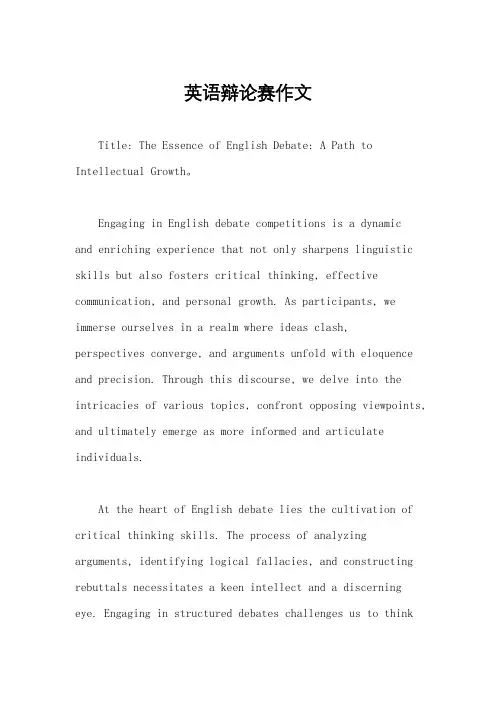
英语辩论赛作文Title: The Essence of English Debate: A Path to Intellectual Growth。
Engaging in English debate competitions is a dynamicand enriching experience that not only sharpens linguistic skills but also fosters critical thinking, effective communication, and personal growth. As participants, we immerse ourselves in a realm where ideas clash,perspectives converge, and arguments unfold with eloquence and precision. Through this discourse, we delve into the intricacies of various topics, confront opposing viewpoints, and ultimately emerge as more informed and articulate individuals.At the heart of English debate lies the cultivation of critical thinking skills. The process of analyzing arguments, identifying logical fallacies, and constructing rebuttals necessitates a keen intellect and a discerning eye. Engaging in structured debates challenges us to thinkon our feet, evaluate evidence objectively, and articulate our thoughts cogently. Each round presents an opportunityto hone our ability to dissect complex issues, discern underlying assumptions, and formulate sound arguments based on evidence and reason.Moreover, English debate serves as a platform forhoning effective communication skills. Articulating our thoughts persuasively and convincingly requires not only mastery of language but also an understanding of rhetorical devices and persuasive techniques. Through rigorous preparation and practice, debaters learn to craftcompelling narratives, employ persuasive language, and deliver speeches with clarity and confidence. These skills transcend the confines of the debate hall, empowering participants to communicate effectively in various academic, professional, and social settings.Beyond the development of cognitive and linguistic abilities, English debate fosters personal growth and self-discovery. As we engage with diverse perspectives and navigate through conflicting viewpoints, we broaden ourhorizons, challenge our preconceptions, and cultivate empathy and open-mindedness. The experience of grapplingwith complex issues and defending our beliefs in a competitive environment fosters resilience, adaptability, and intellectual humility. Through both victories and defeats, debaters learn to embrace failure as a catalystfor growth, persist in the face of adversity, andcontinually strive for excellence.Furthermore, English debate cultivates a spirit of collaboration and camaraderie among participants. Collaborating with teammates, exchanging ideas with opponents, and receiving feedback from judges foster asense of community and mutual respect. Debaters learn to engage in constructive dialogue, appreciate diverse perspectives, and work collaboratively towards common goals. Beyond the competition itself, the bonds forged through shared experiences and mutual respect endure long after the final round concludes.In conclusion, English debate is not merely a competition but a journey of intellectual discovery andpersonal growth. Through rigorous analysis, persuasive argumentation, and collaborative engagement, participants sharpen their critical thinking skills, enhance their communication abilities, and cultivate a deeper understanding of the world around them. As we navigate through the complexities of contemporary issues and engage in spirited discourse, we emerge as more informed, articulate, and empathetic individuals, poised to make meaningful contributions to society.。
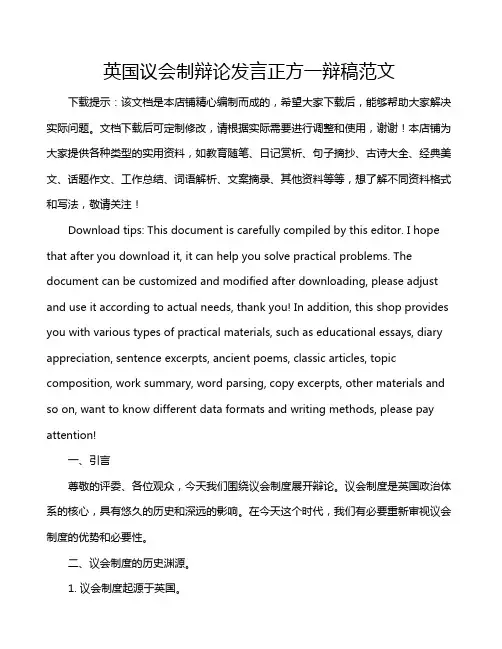
英国议会制辩论发言正方一辩稿范文下载提示:该文档是本店铺精心编制而成的,希望大家下载后,能够帮助大家解决实际问题。
文档下载后可定制修改,请根据实际需要进行调整和使用,谢谢!本店铺为大家提供各种类型的实用资料,如教育随笔、日记赏析、句子摘抄、古诗大全、经典美文、话题作文、工作总结、词语解析、文案摘录、其他资料等等,想了解不同资料格式和写法,敬请关注!Download tips: This document is carefully compiled by this editor. I hope that after you download it, it can help you solve practical problems. The document can be customized and modified after downloading, please adjust and use it according to actual needs, thank you! In addition, this shop provides you with various types of practical materials, such as educational essays, diary appreciation, sentence excerpts, ancient poems, classic articles, topic composition, work summary, word parsing, copy excerpts, other materials and so on, want to know different data formats and writing methods, please pay attention!一、引言尊敬的评委、各位观众,今天我们围绕议会制度展开辩论。

bp英语辩论正方一辩发言稿模板English Response:---。
English Response:Certainly! Here's a template for the first affirmative speaker in a British Parliamentary (BP) style debate:Introduction:Start with a captivating hook or a relevant quote to grab the audience's attention.Introduce the motion and provide a clear definition if necessary.State your team's stance and briefly outline your main arguments.Main Arguments:1. Argument 1:Present your first argument clearly and concisely.Provide evidence or examples to support your point.Anticipate and refute potential counterarguments.2. Argument 2:Introduce your second argument, building upon the first one.Use statistics, anecdotes, or expert opinions to strengthen your argument.Address any weaknesses or limitations in your argument.3. Argument 3:Introduce your third argument, ensuring it complements the previous ones.Utilize logic and reasoning to persuade the audience.Summarize the key points of your argument for emphasis.Rebuttals:Briefly address any points made by the opposing team.Refute their arguments using logic, evidence, or counterexamples.Reinforce your team's position while weakening the opposition's arguments.Conclusion:Summarize your main arguments and restate your team's stance.Leave a memorable closing statement or call to action.English Response:---。

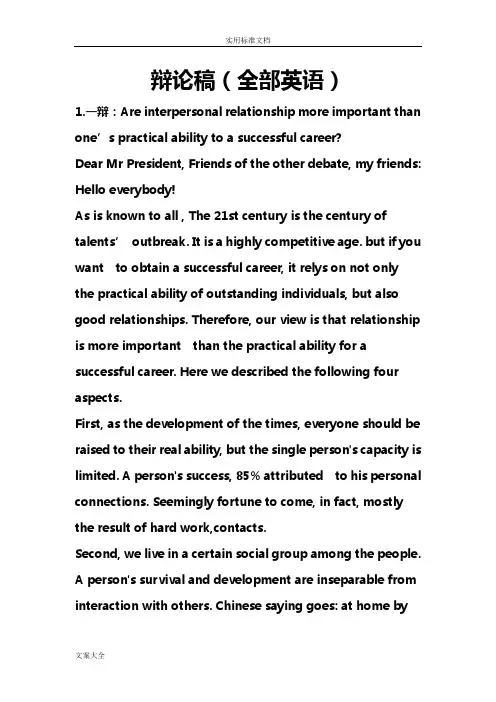
辩论稿(全部英语)1.一辩:Are interpersonal relationship more important than one’s practical ability to a successful career?Dear Mr President, Friends of the other debate, my friends: Hello everybody!As is known to all , The 21st century is the century of talents’outbreak. It is a highly competitive age. but if you want to obtain a successful career, it relys on not only the practical ability of outstanding individuals, but also good relationships. Therefore, our view is that relationship is more important than the practical ability for a successful career. Here we described the following four aspects.First, as the development of the times, everyone should be raised to their real ability, but the single person's capacity is limited. A person's success, 85% attributed to his personal connections. Seemingly fortune to come, in fact, mostly the result of hard work,contacts.Second, we live in a certain social group among the people.A person's survival and development are inseparable from interaction with others. Chinese saying goes: at home bytheir parents, go out to rely on friends. If a person can properly handle the relationship, he can overcome many difficulties.Third, Fowler said that the closet friend is better than deposits in business. With good relationships, we can be better in many areas and create more wealth.Fourth, as a college student, every day we live in the campus, to deeply realize that here is a small community. Even if a person with a greater capacity, he can not organize an event all by himself.A recent survey showed that fifteen percent of success is contributed by a person’s professional knowledge.85 percents rely on personal relationships. In summary, we must insist that relationship is more important than the practical ability for a successful career.2.反方一辩:Respect other friends, chairman of the divides, each friend: hello!Today's opportunity to come to grips with so many friends and this undoubtedly superior personal quality and ability is a promotion of opportunity. We think that an individual career success, personal ability is more important than relationships.We think: an individual career success, by strength, no strength, interpersonal and how? Strength by himself, interpersonal relations also rely on yourself. Interpersonal relationship just for one person to provide a ready a shortcut to success.Admittedly, personal ability and interpersonal is successful two prerequisite, and today we is exploring the among them successful process in which the crucial: first, from philosophical Angle, the development of internal is things root causes, determines the nature of things and the direction of development, external cause is things develop external conditions. Individual struggle is the internal cause and external cause interpersonal relationship is, therefore, own struggle is the key to success; In the second place, from success successful process to see, we first need to determine target, so as to choose direction and type, again through his own personal struggle, with their own quality and ability the enhancement, to expand interpersonal relationship, using interpersonal relationships, achieve their work and the perfect combination of externalWe all know, interpersonal relationship is again good,have no ability to also won't succeed. Only watched his repeated failure. On the premise of a fine winged capacity. Gold shine is the gold itself became! We think: interpersonal influence to be successful, it is like a good journey, the journey to walk, inevitable energy, wind, but if there is no firm to reach objective decision and overcome difficulties of perseverance and hard sweat, is impossible to reach the shore. Downwind or downwind or as long as we firmly stepping to the goal, we will definitely be able to arrive.Look at the great is how successful it, that is the gold and the individual effort, interpersonal relationship is a result of people, if their don't strive for, no ability to fight for, interpersonal relations will not come himself, and waiting for is only pulp. Only oneself to have true ability really ability to overcome everything.To sum up, we think that an individual career success personal ability is more important than relationships.3.反方二辩提问(一辩):Would I ask the first debater a question :Just in your account, you said that 85% person make success with interpersonal relationship, where did the data come from? And even if I don’t challenged thisdata, Edison had said: "genius is one percent inspiration and ninety-nine percent perspiration.”Isn't the personal ability so important?4.一辩回答:As the debate ,ninties perspiration plus one inspiration was a success, a person is required to pay 99 sweat, but the team of ten people only should spend 50 sweats and 50 inspirations to gain the success,Everybady can find which relationship is better meet the efficiency of modern society demands?It is clear that good relationships will be more than infinitely expand your horizons, so you do not have to take so many detours.5.反方二辩提问(三辩):Would I ask the third debater a question :Your statement said: students should pay more attention to build relationships in the school. So I want to ask you whether the study is not important? Obviously, the study is very important, and It is just one’s practical ability.6.三辩回答:7.四辩补充发言:Also known as interpersonal relationships, isa basic concept of sociology, its meaning is between people, the process of interaction, through the thoughts, feelings, behavior of the mutual exchange and interactiongenerated. People as social animals, even with a more tenacious survival skills, from social interaction, and can not have more development, because he is a man in combat. We are a group of people in the struggle.8.二辩提问(一辩):Would I ask the first debater a question : if you think what a CEO needs most is a practical ability, so why will he hear so much about interpersonal relationship lecture?9.反方一辩回答:They attend the lecture interpersonal relationship is in order to increase the ability of individuals with their own personal ability of interpersonal relations to succeed in his career, rather than using interpersonal relationship.10.二辩提问(三辩):Would I ask the third debater a question: practical ability is IQ and interpersonal relationship is EQ, success come from 20% of IQ and 80% of EQ, what do you think of it?11.反方三辩回答:myfellowdebater,youmustbemisunderstandwhatisinterper sonalrelationship.youshouldhaveputinterpersonalrealaters onalrealationshipequatestoEQ.it’sobviouslywrong.Bsides,myfellowdebater,haven’tyouheardofEdison’ssayings:99%perspirationplus1%inspirationequalssuccess? Ithinkmyfellowdebaterdidn’tunderstandwhatisinterpersonalreationship?12.反方四辩补充发言:13.反方二辩小结:Each person is in his own success way, or shallow point in the way of job and work, we will face more challenges, we may have a good interpersonal relationship, we may be introduced to find a good job by friend, but when we truly work, we have no our workmate admitted, we also have no ability to truly achieve the company's demand, so in the end ,we will face ousted, we also have no the so-called success. If interpersonal relationship is important, I think interpersonal relationship also belongs to a part of one’s practical ability, So one’s practical ability is very important.14.二辩小结:Interpersonal relationship is a very good platform to improve one’s practical ability, people can learn more from this platform, in order to improve their ability. In modern society, people live in groups all over the world. If you do not have interpersonal relationship, others will not know your ability . Such as advertising, no matterhow good the commodity is, if others do not know that, and don't use it, the commodity will be a waste product. For another example, if a CEO only have ability but can not deal with various kinds of business relationship, this company will close down. No matter how strong one’s practical ability is, he could not separate himself from the whole society and exists, and he must learn to work with others to be successful, as 80% of EQ lead to success. Practical ability would not make you starve to death in the society, but the relationship can make a better life for you.15.一辩:Interpersonal communication is the important to college students’interpersonal growth andsuccess .Also,it is an important way of exchanging the information and acquiring knowledge in modern society. Many students high IQ, EQ is very low.They often donot handle well that how to get along with others, Nowadays a good communication is the necessary ability and qualityto the most companies recruitment。
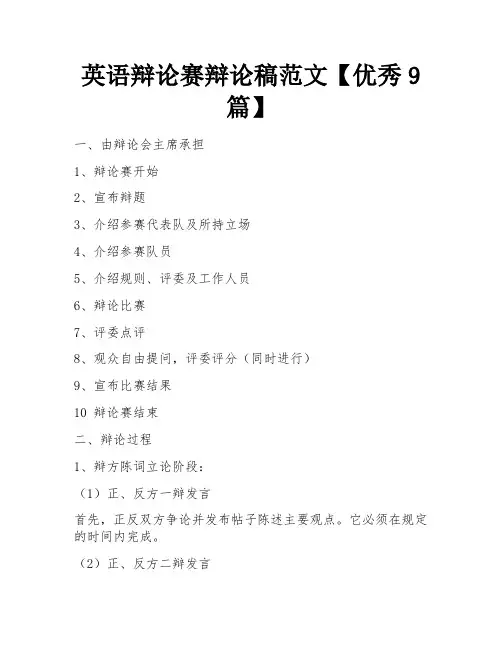
英语辩论赛辩论稿范文【优秀9篇】一、由辩论会主席承担1、辩论赛开始2、宣布辩题3、介绍参赛代表队及所持立场4、介绍参赛队员5、介绍规则、评委及工作人员6、辩论比赛7、评委点评8、观众自由提问,评委评分(同时进行)9、宣布比赛结果10 辩论赛结束二、辩论过程1、辩方陈词立论阶段:(1)正、反方一辩发言首先,正反双方争论并发布帖子陈述主要观点。
它必须在规定的时间内完成。
(2)正、反方二辩发言正方二辩、反方二辩以简洁文字重点从理论上论证己方观点;(3)正、反方三辩发言由正方三辩、反方三辩分别以简洁文字进行实证分析,为本方观点提供论据支持。
2、自由辩论阶段赞成者先发言,反对者再发言,赞成者和反对者轮流发言。
(在相对集中的时间内进行)3、总结阶段由双方四辩进行最后陈述,总结已方观点,反驳对方主观点,(1)反方四辩总结陈词(2)正方四辩总结陈词5.观众提问:观众向双方选手提问,选手必须耐心回答。
双方在提问阶段的表现不记入比赛成绩。
6、评委评分阶段7、由评委对双方观点及辩论过程进行点评。
8、结果宣布三、辩论规则1、每位队员必须在规定时间内完成,超过时间按照弃权处理,并从该队总成绩中减去5分。
2、自由辩论规则自由辩论发言必须在两队之间交替进行,首先由正方一名队员发言,然后由反方一名队员发言,双方轮流,直到时间用完为止。
(每一场的自由辩论在集中的两个小时内完成,每场的具体时间另定,每贴的文字在60--800字之间,每次只能提一个问题。
)四、评判标准(一)将聘请五位评委对本次比赛进行全程评议。
(二)评分标准1、论点明晰,论据充足,引证恰当,分析透彻。
2、迅速抓住对方的观点和错误,反驳到点子上。
3、反映敏捷,应对能力强。
4.表达清晰,层次分明,逻辑严密。
(三)评分办法(团体和个人分别记分,满分均为100分)(1)审题:对所持立场能否从逻辑、理论、事实等多层次、多角度理解,论据是否充足,推理关系是否明晰,对本方的难点是否具有有效的处理方法。

BP英国议会制辩论资料
辩题,应该禁止或限制石油和天然气开采吗?
正方观点,我们认为应该禁止或限制石油和天然气开采。
首先,这些化石燃料的开采和使用是导致气候变化的主要原因之一。
随着
全球气温不断上升,我们已经看到了极端天气事件的增加,这对人
类和生态系统都构成了巨大的威胁。
其次,石油和天然气的开采对
环境造成了严重的破坏,包括水和土壤污染,野生动物栖息地破坏等。
最后,我们认为应该加快转型到可再生能源,这不仅可以减少
对化石燃料的依赖,还可以创造更多的就业机会和经济增长。
反方观点,我们认为不应该禁止或限制石油和天然气开采。
首先,这些化石燃料是目前全球能源供应的主要来源,禁止或限制开
采将导致能源短缺和经济衰退。
其次,石油和天然气产业在很多国
家都是重要的经济支柱,禁止或限制开采将导致数以百万计的工作
岗位丧失。
最后,我们认为应该采取技术和管理手段来减少化石燃
料的环境影响,而不是简单地禁止或限制开采。
结论,在这场辩论中,我们听到了双方对于石油和天然气开采
的不同观点。
虽然禁止或限制开采可能会带来一些经济和社会方面
的困难,但我们也不能忽视化石燃料对气候和环境的影响。
我们希望政府和企业能够在保障能源供应的同时,加大对可再生能源的投资,推动能源转型,实现可持续发展。
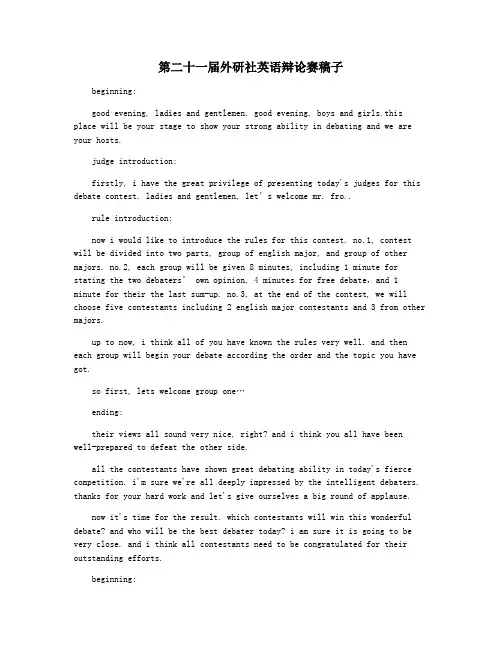
第二十一届外研社英语辩论赛稿子beginning:good evening, ladies and gentlemen. good evening, boys and girls.this place will be your stage to show your strong ability in debating and we are your hosts.judge introduction:firstly, i have the great privilege of presenting today's judges for this debate contest. ladies and gentlemen, let’s welcome mr. fro..rule introduction:now i would like to introduce the rules for this contest. no.1, contest will be divided into two parts, group of english major, and group of other majors. no.2, each group will be given 8 minutes, including 1 minute for stating the two debaters’ own opinion, 4 minutes for free debate,and 1 minute for their the last sum-up. no.3, at the end of the contest, we will choose five contestants including 2 english major contestants and 3 from other majors.up to now, i think all of you have known the rules very well. and then each group will begin your debate according the order and the topic you have got.so first, lets welcome group one…ending:their views all sound very nice, right? and i think you all have beenwell-prepared to defeat the other side.all the contestants have shown great debating ability in today's fierce competition. i'm sure we're all deeply impressed by the intelligent debaters. thanks for your hard work and let's give ourselves a big round of applause.now it's time for the result. which contestants will win this wonderful debate? and who will be the best debater today? i am sure it is going to be very close. and i think all contestants need to be congratulated for their outstanding efforts.beginning:good evening, ladies and gentlemen. good evening, boys and girls.this place will be your stage to show your strong ability in debating and we are your hosts.judge introduction:firstly, i have the great privilege of presenting today's judges for this debate contest. ladies and gentlemen, let’s welcome mr. fro..rule introduction:now i would like to introduce the rules for this contest. no.1, contest will be divided into two parts, group of english major, and group of other majors. no.2, each group will be given 8 minutes, including 1 minute for stating the two debaters’ own opinion, 4 minutes for free debate,and 1 minute for their the last sum-up. no.3, at the end of the contest, we will choose five contestants including 2 english major contestants and 3 from other majors.up to now, i think all of you have known the rules very well. and then each group will begin your debate according the order and the topic you have got.so first, lets welcome group one…ending:their views all sound very nice, right? and i think you all have beenwell-prepared to defeat the other side.all the contestants have shown great debating ability in today's fierce competition. i'm sure we're all deeply impressed by the intelligent debaters. thanks for your hard work and let's give ourselves a big round of applause.now it's time for the result. which contestants will win this wonderful debate? and who will be the best debater today? i am sure it is going to be very close. and i think all contestants need to be congratulated for their outstanding efforts.hello everyone,i'm honored to be nominated the monitor for today's debating contest.the topic for our debate today is ......first please let me introduce the contestants of both sides.those on the pros are xxx, xxx, xxx, and xxx.those on the cons are xxx, xxx, xxx, and xxx.as everybody is ready now, here starts the debate.now give us a fair and sportsmanlike debategood morning/afternoon/evening ladies and gentleman(orstudents),contestants and adjudicators(裁判).today we are debating the topic (报一下辩论题目) on the affirmative side we have (报一下正方参赛者的顺序),and on the negative side we have (反方参赛者的顺序).both teams have showed great debating ability in today's fierce competition. let us now await for the adjudicator's scoring. i am sure it is going to be very close.and i think all contestants need to be congratulatedfor their outstanding efforts.the score is in, and the winner of today's debate is (报赢的一方)than you all for coming.2.welcome to the debating competition of the issue “the advantages s and disadvantages of qinghaitibet railway”. we have 8debators today,4 on each side and the positive side is leaded by xxx,the rest debaters are xx, xx. and the members of the negative team are xx,xx is the leader of theirteam .ok ,good luck to they(.or hot welcome to the)next, i want to introduce today’s judges, they are our dear instructor mrsyan,and our classmates xx ,xx,xx ,xx, hot welcome to all of you .and thanks to all for joining today’s debating comp etition.now, i would like to introduce the rules for the contest.the first is the time .each debater is allowed to exprein limited.secondly, speakers are not allowed to bring any notes in hand.thirdly,welcome comeback ,after our ju dges’ discussion, the most exciting moment is coming, the winner of today’s debating competition is the---.and the best debater is .congratulation!i hope we can expreourselves on the stage in english ,i hope we can show what we have learned in the competition, i hope we can exchange experience of how to learn english better, i hope we all make good use of this opportunity to improve ourselves.ok, this is the end of today’s english debating competition .thank you all for join us today, i hope all of you can have a good time .thank you .。
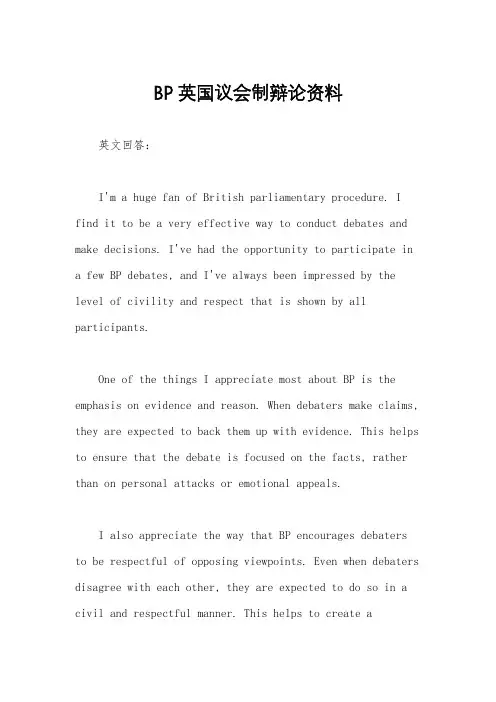
BP英国议会制辩论资料英文回答:I'm a huge fan of British parliamentary procedure. I find it to be a very effective way to conduct debates and make decisions. I've had the opportunity to participate in a few BP debates, and I've always been impressed by the level of civility and respect that is shown by all participants.One of the things I appreciate most about BP is the emphasis on evidence and reason. When debaters make claims, they are expected to back them up with evidence. This helps to ensure that the debate is focused on the facts, rather than on personal attacks or emotional appeals.I also appreciate the way that BP encourages debaters to be respectful of opposing viewpoints. Even when debaters disagree with each other, they are expected to do so in a civil and respectful manner. This helps to create aproductive atmosphere where everyone feels comfortable sharing their ideas.Overall, I believe that BP is a great way to conduct debates and make decisions. It is a system that is based on evidence, reason, and respect. I encourage everyone to learn more about BP and to participate in a debate if they have the opportunity.中文回答:英国议会制辩论(BP)是辩论和决策的一种非常有效的方式。

BP英国议会制辩论资料
尊敬的议长、各位尊敬的议员们,今天我们将就BP英国议会制
辩论资料展开讨论。
议会制辩论资料是议会内部辩论的重要工具,
它记录了议员们在辩论中的发言和观点,为议会决策提供了重要的
参考依据。
然而,近年来一些人质疑议会制辩论资料的准确性和公
正性,认为其在一定程度上影响了议会辩论的质量和效果。
首先,我们来看议会制辩论资料的准确性。
一些人认为,议会
制辩论资料可能存在记录不全、篡改或失实的情况,这将严重影响
议会辩论的公正性和客观性。
如果议会制辩论资料的准确性无法得
到保障,那么议会辩论的结果也将难以令人信服。
其次,议会制辩论资料的公开透明度也备受质疑。
一些人认为,议会制辩论资料的公开程度不够,导致公众对议会辩论的了解程度
不够,也无法有效监督议员们的发言和行为。
这将严重影响议会的
民主监督功能,不利于建设一个公正、透明的议会制度。
最后,议会制辩论资料的管理和运用也需要进一步完善。
一些
人认为,议会制辩论资料的管理过程中存在不合理的安排和运用,
导致其在议会决策中的作用受到了一定程度的削弱。
如果议会制辩
论资料的管理和运用不能得到合理规范,那么其在议会决策中的作用也将受到质疑。
综上所述,议会制辩论资料在一定程度上存在着准确性、公开透明度和管理运用等方面的问题。
因此,我们需要进一步完善议会制辩论资料的管理机制,提高其准确性和公开透明度,以确保议会辩论的质量和效果。
希望各位议员们能够就此展开深入讨论,共同寻求解决之道。
谢谢!。
英语议会辩论发言稿模板English Debate Speech Template.1. Introduction.Start with a strong hook to capture the audience's attention.State the topic of the debate and your stance clearly.Provide a brief overview of the main points you will be discussing.2. Body Paragraph 1。
Present your first argument in support of your stance.Provide evidence to support your claim, such as statistics, research, or expert opinions.Address any potential counterarguments and provide rebuttals.3. Body Paragraph 2。
Introduce your second argument.Present evidence and address counterarguments as in Body Paragraph 1.4. Body Paragraph 3 (Optional)。
Present an additional argument or perspective to strengthen your case.Provide evidence and address counterarguments as in Body Paragraphs 1 and 2.5. Transition.Recap the main points you have made so far.Signal that you are moving to a new section of the speech.6. Opposing View.Acknowledge the opposing viewpoint and state its main arguments.Provide evidence or examples to support the opposing view.7. Rebuttal.Present evidence and arguments to counter the opposing view.Point out any flaws or weaknesses in the opposing arguments.8. Conclusion.Summarize your main arguments and restate your stanceon the topic.End with a strong closing statement that leaves a lasting impact on the audience.中文回答:英语议会辩论发言稿模板。
谈论英语辩论赛英语作文The Thrill of English Debating Championships.Engaging in an English debate championship is not just a competition; it's an experience that shapes one's thinking, communication skills, and perspectives. It's a dynamic blend of wit, logic, and passion, where every word spoken has the potential to sway an audience or sway an opponent.The debate, often centered around topical issues or abstract concepts, requires participants to delve into research, formulate arguments, and then present them in a way that is both persuasive and coherent. This process, from concept to execution, is an intense one, filled with challenges and triumphs.Research: The Foundation of a Strong Argument.The first step in any debate preparation is research.This involves delving into various sources, such as academic journals, news articles, and even primary sources, to gather evidence and information that supports one's argument. The aim is to find facts, statistics, and quotes that can back up one's position and potentially counter any opposing arguments.During this process, participants often encounter new perspectives and ideas, which can broaden their understanding of the topic. This, in turn, makes their arguments more nuanced and comprehensive.Formulating Arguments: The Art of Persuasion.Once the research is complete, the next step is to formulate arguments. This involves identifying key points, constructing logical chains, and ensuring that each argument flows seamlessly into the next. The aim is to create a narrative that is both compelling and difficult to refute.In this phase, participants must also anticipate theiropponents' arguments and prepare counter-arguments. This predictive thinking is crucial, as it helps debaters stay on top of their game, even when faced with unexpected counter-attacks.Presenting Arguments: The Drama Unfolds.Finally, comes the moment of truth: the debate itself. This is where all the hard work and preparation comes together, as debaters stand before an audience and present their arguments.The dynamics of a debate are truly thrilling. One debater might use humor to diffuse a tense situation, while another might employ emotional appeals to resonate with the audience. The back-and-forth between opponents, as they trade blows and counter-arguments, is a testament to their wit, quick thinking, and mastery of the subject matter.The Impact of Debating.Beyond the thrill and excitement of the competition,English debate championships have a profound impact on participants. They learn to think critically, analyze complex issues, and communicate effectively. They also gain a deeper understanding of different perspectives and learnto respect diverse viewpoints.Moreover, the camaraderie among debaters is unique.They support and encourage each other, learning from each other's strengths and weaknesses. This shared experience bonds them together, creating lasting friendships and memories.In Conclusion.English debate championships are not just about winning; they are about personal growth, learning, and discovery. They provide a platform for young minds to flex their intellectual muscles, test their mettle, and emerge stronger, wiser, and more confident. They are a celebration of wit, logic, and the beauty of the English language, anda testament to the power of persuasion and communication.。
英语专业的论文辩论范文英语专业的论文辩论范文导语:是我们论文的`研究成果的详细呈现,在论文辩论时,一篇语言流畅,构造清晰,内容全面的开场白,既能呈现出你自信的状态,又能简洁的呈现出论文的主要构架,令评委老师对你的研究成果有大致了解。
下面是收集了英语专业的论文辩论范文,仅供大家参考!Good morning, all appraiser mittee members. I am **** and my supervisor is xx. With her constant encouragement and guidance, I have finished my paper. Now, it is the show time. I will present my efforts to you and wele any correction.The title of my paper is On Transformation of Parts of Speech in Translation. I choose this as my topic due to the following reasons. Different languages have different standards to distinguish parts of speech. Each language has its own special structure. And there are no equivalent parts of speech between different languages. In order to make the target version more idiomatic and standard, the transformation of parts of speech is always used by translators. So the transformation of parts of speech is playing a more important role in English to Chinese based on different characteristics of English and Chinese. For the above facts, I select the subject of On Transformation of parts of speech as the title of my paper.I hope by studying this topic we can know the importance of the transformation of parts of speech in English to Chinese translation. Through transformation, we can get the better version and improve the translation skills.The way of thinking and expressing is quite different between Chinese and English. English is a kind of static languages which tends to use more nouns. While Chinese is a dynamic one in which verbs are often used.So when we make translation in English to Chinese, we should know this point and shift the parts of speech.Part one presents an introduction to the basic concepts of parts of speech and transformation.Part two discusses the definition of translation and emphasizes the importance of transformation of parts of speech in the course of translation.Part three gives four basic ways of transformation of parts of speech through illustrative examples. There are transformed English words into Chinese verbs, nouns, adjectives and adverbs.Part four presents some problems about transformation and gives some advise to solve the problems.Part five draws some conclusions that transformation between parts of speech is necessary for us to achieve good translation. It is demonstrated that we can have a goodmaster of transformation and improve the translation. In addition, we must continuously study and explore in all kinds of translation practices.OK! That is all. Thank you! Please ask questions.。
英语辩论稿范本北京外国语大学英语专业议会制辩论DEBATESTHIS HOUSE BELIEVES THAT HOUSEWIVES SHOULD BE PAID FOR THEIR WORKHousewives are entitled to payThe philosophical basis of entitlement for pay is derived from the notion that if something comes into being as the product of an individual’s labor, then that individual is entitled to the profit and benefit of such a product because its existence was resultant of that individual’s labor[1]. That in this case the labor is on services does not make any difference, the product of the housewife’s labor is that the children are looked after and domestic matters are all sorted. This is beneficial to society as housewives in addition to helping their own family are likely to have the time to help out others –through volunteering, through looking after other’s children after school etc.It is estimated that the value of a housemaker’s services would be equivalent to approximately £30,000 per year[2]. In the same way that any product or service is created, offered or manufactured by individual workers, the services of home-keeping are delivered by the labor of the home-keeper. Just as all workers are entitled to remuneration for the goods and services they create, so is a housewife is so entitled for the house-keeping services they offer.Not all labor is rewarded with wages or pay despite the fact that goods and services are products of said labor. For example, voluntary and charity work are both types of labor that is not paid. The distinction is where the work is done and the obligations owed to people as a result. Home-keeping is a voluntary job thathas its own forms of remuneration (family connections etc.) in the same way that volunteering and charity work do (e.g. feeling as though you are part of something larger).Paying housewives promotes more positive images of women and family lifeGender stereotypes dictate that the woman’s place is in the home and that that is an inferior position in the social hierarchy than that of the male’s corporate bread-winner status. The stereotype is particularly dam aging to women’s expectations for themselves and the way society treats women.By paying housewives for their work, a greater emphasis is placed on the role of the home-keeper and on the women that tend to this job. It elevates the position of women in the household by economically empowering them and giving them the very thing that usually impliesthe greater importance of the bread-winners in the family (economic power and status). Moreover, it elevates societal views of housewives and home-keepers by valuing their contributions to the household and society in a tangible, monetary way that society cares about.Paying housewives for their work grants greater social status and power to women and family lives, which improves views of women and the roles they take in the family.Paying housewives would not make much difference to images of women and family life, and could even make things worse rather than better. By paying housewives, monetizing the position of housewife and home-keeper, the state re-affirms the idea that the only true value a person can hold is an economic one and that the only way to assess and quantify the value of an individual or their impact is through financial means. Re-enforcing such a financial-centric version of worth and value is dangerous to housewives, who, by any reasonable expectation, will never make as much as private-sector professionals such as CEOs. It simply re-enforces the inferiority of house-keeping and the role of the family unit in society.This pay gap simply re-affirms prejudice and bias of the inferiority ofhome-keeping as a profession and gives tangible evidence to support this by placing a monetary value on what housewives do and inevitably not including the non-monetary benefits, such as the children having their mother to take them home from school.Keeping a division between the money-led economic world and the love-driven family world is beneficial to the family dynamic and the perceptions of all those involved.Paying housewives for their work is an important form of economic empowerment.One of the most important factors of oppression of women’s rights, particularly in the developing world, is dependence[1].Women are often confined to the home by force, lack of opportunity or social stigma, on behalf of their husbands. When she is not paid, a housewife must rely on her husband for money, especially if she has children she is expected to take care of. Economic empowerment allows further freedom for women in countries where women are confined to the home[2]. By making women economic actors, you empower them to engage in different social structures and hold a stake and position in the centres of economic power. This is the most empowering tool one can offer women in most countries around the world[3].By paying housewives for their work, you offer one of themost powerful forms of social empowerment for women around the world.It is highly unlikely that this can be implemented in any country where female empowerment is as restricted as is discussed. If women are as dependent and oppressed as the proposition suggests, the political will to pass such legislation will not exist. Even if a law were passed, the pay would be very low, and so the wife would still rely on the husband’s income.Payment and obligation works differently in public and in private.The economic sphere and the private (family) sphere have separate obligations and systems of contracts. The way in which the economic system works is that generally people are paid for their labor by those who benefit from it, either directly or indirectly. This is a mutual relationship of monetary-labor exchange. In the family sphere, the contracts are based on personal obligation and the family unit as opposed to individual contraction of services. The family unit is a pre-existing relationship not created on labor-pay agreements. Individuals opt into being a parent in a family unit on a voluntary basis and with no expectation or pretence of return for their services, except perhaps from their children in the future. Remuneration is created in the form of a functioning, rewarding family unit and family life and the products and services produced are of no quantifiable monetary value nor can they be sold or do they create wealth. Because housewives do not labor for anybody outside of their household, they should not be paid by anybody outside of their family. Moreover most of the work that housewives do would have to be done by a member of the family unit regardless of whether everyone was also engaged inmonetized work –there would still need to be washing, cleaning, shopping etc done.Housewives do not exist as workers in the economic sphere as they do not create a monetized product with their labor and opt into the agreement on voluntary non-monetary bases. As such, they are not entitled to pay.The job of housewives provides an essential service to society—to raise a healthy family—and so those who perform the job should be paid. Even if a product or service is not economically quantifiable, the person who provides it may have created something that otherwise would not existthrough the exertion of their labor. Moreover, simply because they never had an option to opt into a monetized agreement or exchange does not mean that they do not deserve such an option in the future or that their services are not economically valuable, and thus, entitles them to wages.Paying housewives reduces social mobilityBy paying housewives for their work, you create negative stereotypes about families and women by commodifying the role of home-keeper. Paying housewives for their work re-enforces the very framework that is seen as oppressive on home-keepers. It creates a system in which women are even more strongly expected to be housewives than they are now, rather than seeking out career jobs with upward mobility. The result is that women are discouraged from seeking to fulfil their own dreams by creating their own careers as they are more firmly chained to their traditional role. This is damaging to societal views of women and the family.As a result the full potential of many more women will not be reached. As is the case in Saudi Arabia women are likely to bevery well educated but then have their education and talents wasted by being expected to remain in the home.[1] This would neither be good for the individuals involved or the economy as a whole.Paying housewives a wage would improve not reduce social mobility. Many women would still choose to go to university and the vast majority who do will still want to work. Paying housewives will not prevent any women who wants to work from working. Rather it will simply provide another option for those who wish to devote themselves full time to their family. This will give these women some financial freedom giving them more opportunities to educate themselves and their children so that they can get a better job than they otherwise would when they no longer wish to just be a housewife.Paying housewives is financially impractical.On a very practical level, this policy could never be implemented. As much as housewives are valuable members of society, it is economically impossible to pay them wages. It is only poss ible to increase somebody’s pay if that person creates increased wealth. There is no direct increase in wealth creation caused by housewives and therefore it would be impossible to gain a direct or accurate valuation or mechanism of exchange for housewife pay.Even if there was no market mechanism needed, and assuming that there is no interest in getting an accurate valuation of housewife economic contribution, there is no way for a government to finance this.Without the creation of a product or service that has a consumer who would be able to use the money to purchase such services, there is no method of capital accumulation to reimbursethe home-keeper with. The baby or child who is receiving the service does not have the ability to pay. Should the government attempt to fill this void, it would be prohibitively expensive to create wages for every single housewife in a country. There are many ways to implement this on a practical level. Wages can be created through tax exemptions as opposed to the creation of new streams of wages and wealth.Moreover, the prohibitive expense can be paid for by an increase in taxation. Home-keeping can be seen as a public good as it create good, strong homes and helps create constructive bases of support that help create productive future members of society, it can qualify as a public good that would therefore be a legitimate expense to tax the public for.An article in a popular online newspaper questioned how one could put a price tag on household work.“Does she get paid extra for cooking up an elaborate birthday dinner, as opposed to dishing up the usual dal chawal?” Activist Maya Jo hn provides a different solution in her opinion piece in The Hindu, “Instead of asking a man to pay his wife for her domestic work, the state must create jobs for women outside the homein order to truly empower them.”Sadhguru: The most basic structure of the social unit is the family. Fortunately so far, the government has had the wisdom to stay away, keep their hands off the family, because they know they will mess it up. But it looks like now they want to enter your family in the guise of giving justice to women. You need to understand one thing, if a woman is paid for the chores that she does at home, she can also be fired. No divorce is needed. She is not cooking properly, fire her tomorrow morning. The next day you can hire somebody else. The sanctity of what it means to bea family will disappear.Not just the husband, even the children will ask, “Well, you are being paid, why are you not doing this?” The sanctity of being a wife, the sanctity of being a mother, the sanctity of being a feminine presence in the family, all this will be ruined and she will be reduced to a paid-for maid. The worst possible vocabulary could be used in this scenario. It is nobody’s business to enter a family and say how it should be run. The laws are on the street and not inside one’s home. That is a place where nobody should meddle except the people who live there.In today’s society, it has been observed that the title of “housewife” is inadvertently less valued than that of a “working woman”. Will the mere payment of a salary elevate the role of the housewife and make it more worthy of social recognition?Housewives are entitled to pay.On a practical level, a family cannot pay housewives because a child does not have the means to pay his or her mother.Paying housewives promotes a more positive image of stay-at-home mums.Paying housewives reduces the value of their contribution.Would you pay to your parents because they gave you birth?OUR and RELATION are the two things which made her to work for you. Yes you need to pay her. But not in money. You should pay her in Love and Affection your wife deserves.Paid by whom?For one to be a housewife requires that she is firstly a wife, she is married. Yes who is financially supporting her [and their children]? Her husband.In a manner of speaking she is being paid, she is financiallysupported.Yes absolutely! they should be paid.But don't call them house wives my friend. You should have asked; should our wives, mother's, sisters and daughters be paid for whatever they do for our families?Yes they should be paid back byloving them,by letting them know that no matter what we stand by them, by caring for them,by respecting them,but never think of paying them back in money. Never ever.They are not housewives. They work for the house. And they work harder than we think we do. They should be paid with love, care, respect,affection, surprises and much more.Italian campaigners call for housewives to be paid a salary Lawyer Giulia Bongiorno says wage would give women who work in the home dignity and economic independence If, however, you are an actual housewife and your daily chores are done quietly behind closed doors, chances are your efforts go unremunerated.But a prominent pair of campaigners in Italy, a country with an estimated 5 million casalinghe (housewives), a moribund jobs market and a lingering patriarchal culture, this week threw their weight behind an eye-catching proposal they say would boost equality and fight domestic abuse: a salary for women working in the home.The proposal, which comes as the prime minister, Matteo Renzi, prepares to publish a reform package targeting Italy's record unemployment, has been criticised as retrograde,unworkable andpotentially counterproductive by some critics.But it has, in some quarters at least, refocused debate on what the eurozone's third-largest but arguably most sluggish economy could do to combat gender stereotypes and boost a female employment rate that is the EU's second lowest.There, they saw that many victims of domestic violence were not reporting their abuse to the police for want of an alternative lifestyle that was economically viable. "We have [in Italy] many women who die inside household walls because they do not have economic independence," said Bongiorno.the allowance being proposed was not just for abuse victims but for all housewives, and the small number of their male equivalents, "in recognition of the work's social dignity" and economic importance."I want to destroy this great prejudice that says: 'I am the one who earns; you have nothing,'" she said, adding that women who chose to work at home should be rewarded, not humiliated. "They must not beconsidered B-list citizens," she said.The proposal envisages a monthly allowance being paid to the home worker either by the Italian state or, in households with a "significant income", by their spouse or partner. Bongiorno says she knows this last point will prove the most controversial."Bongiorno and Hunziker propose a housewives' salary to 'reduce discrimination'. I am strongly against this. There is only one way of doing so: WORK," wrote journalist Giulia Innocenzi on Facebook."Why not spend the money set aside for a hypothetical housewives' salary on nurseries and incentives for femaleemployment, and thus try to remove Italy from the embarrassing last places of classifications for the number of women who work?""I am the first to say that nurseries and work are fundamental but there is also a social value in the work carried out in the family. We must not cancel it out."For many, though, the idea just doesn't wash. Daniela Del Boca, professor of economics at the University of Turin, said that, although "theoretically fair", the allowance would be "a terrible disincentive to look for a job"."And the impact of women working is incredibly important –for the income of the family, for their own independence, for the message that they send to their children, especially to their daughters, that working is important and fundamental to independence," she said.The kind of financial independence that Bongiorno and Hunziker were advocating, she added, was achieved "by doing something that does not take you outside the home but relegates you to a role which is by definition subordinated".by providing a financial reward for those of either sex who choose to stay at home to perform household functions, the allowance could help combat the idea that such work is a purely female realm.But Del Boca says that, in a country with such entrenched cultural expectations, this is unrealistic. You only have to look at the "very, verylow number" – only 6.9% in 2011 – of fathers who choose to take full paternity leave, she said, to see how deeply engrained traditional gender roles remain."You could say: give [money] to everyone who provides carework. Which would be good," she said. "But not in this country. Not in this moment in which there is so much crisis and, already, discrimination."comments{1}Keeping a family running is a full-time job, as any housewife would testify.So they might not be surprised to learn that researchers reckon a housewife's work is worth £30,000 a year.They broke down the costs according to the average wages paid to professionals for tasks such as getting children dressed and ready for school, feeding them, helping with homework and getting them ready for bed.The survey revealed the average housewife spends 273 minutes (4.55hours) each day looking after the children - getting them dressed and ready for school, feeding them, entertaining them when they get home from school, helping with homework and getting them ready for bed.A further 71 minutes will be spent vacuuming, dusting, washing, cleaning toilets and bathrooms, tidying, and cleaning the floors.Cooking is another big chore for housewives - who spend about 63 minutes a day in the kitchen preparing culinary delights for her loved ones.By comparison, an experienced head chef taking home a respectable £16.48 an hour would earn themselves £17.30 for their time.Not surprisingly, 71 per cent of women polled say that the successful running of the family home is a full time job. And 66 per cent of women feel their efforts to keep the house runninglike clockwork go。
THW criminalize those who refuse to help fellow citizens inimminent dangerThe law we were talking about here is not aim to force people to become reckless heroes. It is aimed to warn us against cold-bloodiness and punish those who see other’s lives as nothing. There is no excuse for leaving someone to die when we are capable of helping.Just like the incident of 小悦悦, in 2009, three college students in Hubei were trying to save two drowning boys, but accidentally slide into the river. In the whole time, a fishing boat was there watching. But, the boat owner cruelly told their friends that he would only pick up their bodies but would not come to their rescue. In the end, those three students sacrificed their lives and the two boys lived. We can make a very long list of such tragedies, but a heart-breaking fact is that it will never be complete unless we start doing something to stop that kind of cruelness. Leaving somebody to die is not a single case, and it IS necessary to set laws to warn the whole society. We strongly believe that this kind of cold-blooded behavior should be and can be punished by the criminal law for it is necessary and practical.Firstly, concerning the difference between morality and the law, there is no doubt that ethic and law differentiate in forms, measures and contents; however, these two concepts are not completely separated from each other. In contrast, the legalization of moral issue is a perfectly normal phenomenon. The law is the bottom line of morality and morality is the highest of law. No matter what kind of legal system we are formulating, we are formulating it based on the ethical circumstance of a certain period of time. The opposition’s argument is that leaving somebody in imminent danger is an ethical problem other than a legal issue. However we must ask, if the code of morality is no longer fun ctional in today’s society, why can’t we use the legal system to eliminate or at least reduce the possibility of this kind of unnecessary tragedies? When a kind of behavior has gone beyond the moral bottom line and moral standards can no longer restrain the situation, it is necessary that we use the weapon of law to interfere and control.Secondly, concerning the feasibility, in France, anyone who is capable of helping others but chooses to give up and do nothing will be sentenced to 5-year in prison and a high penalty of 75 thousand Euros. Germany, Italy and half of European countries, Japan, Egypt and several states of the U.S….S o manycountries have already criminalized those who refuse to help fellow citizens in imminent danger, giving us the sample to follow. Since the year 2001, representatives of the National People’s Congress had never stopped proposing to set laws against turning away from a dying person. The so-called “difficulties” and “challenges” from the opposing view, in our opinion, cannot stand still. If a wrong behavior is so severe that we are considering setting laws against it, it of course means there are mountains in front of us. But if the law is necessary, then we have to come up with solutions and conquer the difficulties. If we leave it there just because it is difficult then we are just running away from reality and the current situation in no way can be improved. Not to mention other countries have already set examples for us, all we need to do is to make the law suitable for China’s current situation.In respect of the legal system, we only propose to punish those who refuse to conduct low cost rescue when they are capable. That is, he or her own life will not be endangered if he or she provides help, and he or she is capable of at least calling for professional help. Also, we would suggest that we in the mean time formulate complementary laws to support this.The law is always a two-bladed sword. The meaning of wedebating here is to discuss whether the advantages outweigh the disadvantages. We still have people hit and run after we criminalize it, but does that mean we d on’t have to set laws against any wrong doing if they are still going to happen? The value of life is the highest above all and our laws should reflect this most basic rule of moral. Respecting other’s life and lending a hand when someone is in imminent danger –is the bottom line of morality and therefore makes perfect sense to be included in criminal law. The tragedy of 小悦悦and others shall not be repeated again and again in China. All in all, we strong believe that we should criminalize those who refuse to help fellow citizens in imminent danger.。